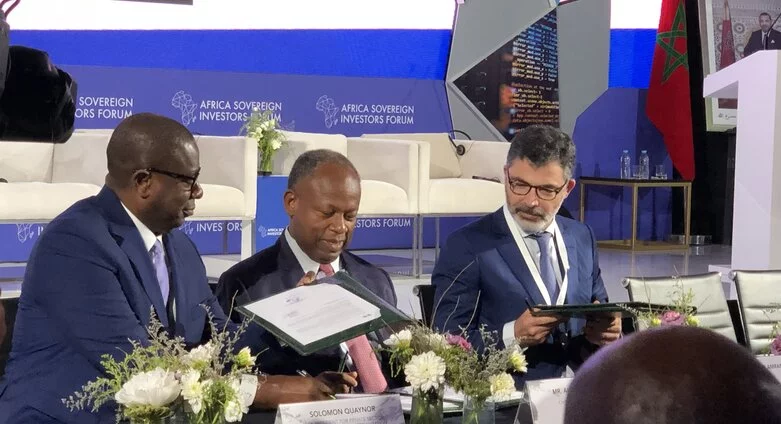- African countries need to leverage more private funds to meet the estimated annual infrastructure financing needs of between $68 billion and $108 billion
- Africa needs to utilise more private cash to finance infrastructure developments as part of public-private partnerships, which would help free public funds
- African Development Bank has invested over $44 billion in infrastructure across transport, energy, health care, ICT, and water and sanitation, which was crucial to the continent’s growth and development
The chief executive officer of Africa50, an offshoot of the African Development Bank that focuses on infrastructure investment Bank, stated on Tuesday in Marrakech that African countries need to leverage more private funds to meet the estimated annual infrastructure financing needs of between $68 billion and $108 billion. Africa50 is an offshoot of the African Development Bank.
CEO Alain Ebobissé made these remarks on the eve of the launch of a U.S.-Africa business summit. He was speaking on utilising more private cash to finance infrastructure developments as part of public-private partnerships, which would help free public funds to be allocated to projects that the private sector has rejected.
Role Africa50 is playing to help bridge Africa’s infrastructure financing gap.
Dr. Akinwumi Adesina, President of the African Development Bank Group and Chairman of the Africa50 Board of Directors, has highlighted the vital role that Africa50 is playing in helping to bridge Africa’s infrastructure finance gap.
At the event, Adesina informed the audience that over six years, Africa50 had invested $5 billion in 16 private-sector-focused enterprises.
Adesina remarked.
I am proud of Africa50; It is a top-notch organisation advancing infrastructure development in Africa by planning projects, bringing them to a commercially viable stage, and funding them.
Alain Ebobissé, the CEO of Africa50, said:
Africa50 is a catalyst and essential component. Private investment is necessary to achieve our goal of providing African nations with sustainable infrastructure.
To work together to construct climate and green, resilient infrastructure developments across Africa, the African Development Bank, Africa50, and the African Sovereign Investors Forum—chaired by Morocco’s strategic investment vehicle Ithmar Capital—signed a memorandum of understanding. The alliance anticipates securing sizable finance for sustainable infrastructure from African institutional investors.
He continued by saying that the African Development Bank had already invested over $44 billion in these industries.
The CEO of the Bank Group emphasised Africa50’s investment in the Kinshasa-Brazzaville bridge scheme and the digital infrastructure project for Kigali Innovation City, which would result in the creation of over 50,000 employment.
Through the Alliance for Green Infrastructure in Africa, Africa50, in collaboration with the African Development Bank and other institutions, is assisting Africa in making the green evolution to cleaner renewable electricity from solar, hydropower and thermal.
China is the top Africa Infrastructure Investor
Since 2013, China has become the primary investor from a non-African country in Africa, spending billions of dollars on developing the continent’s infrastructure. The United States is increasing its efforts, but it is still far from catching up to other countries.
US Investments in Africa
The annual general meeting of Africa50 was held the night before a four-day economic summit between the US and Africa in Morocco.
US Corporate Council on Africa President Florizelle Liser emphasised the significance of US investor engagement with the African continent in her speech in Marrakech. She stated:
Global investors are valued at $100 trillion, and US investors account for 45% of that total. They may be hesitant to invest in Africa, but our responsibility is to help them develop trust with African institutions. For this reason, we are connecting them with regional financial organisations and institutions like Africa50 and the African Development Bank. Together, I have faith that we can succeed.
The director of the United States Trade and Development Agency (USTDA), Enoh Ebong, told Reuters that the agency had planned to allocate $26 million to finance viability studies of African investment projects in the previous year. These projects had the potential to generate $17 billion in financing.
“Sub-Saharan Africa is one of our major portfolios at the agency,” she said, adding that she sees demand growing for US companies from the continent. “Sub-Saharan Africa is one of our largest portfolios at the agency.”
While American businesses handle the USTDA-funded feasibility studies, African partners focus on business development “may acquire funding from any of the parties available. We do not have any requirements about the source of the financing for that initiative; nevertheless, we would prefer that they work with other government agencies in the United States, “Ebong added.
According to Ebong, the return on investment for feasibility studies is approximately $117 for every dollar spent, which converts into jobs in the United States.
She went on to say that infrastructure is “essential to commerce”, that “we are totally competitive,” and that “This is evidenced by the fact that many partners are choosing American companies over Chinese ones when they are in direct rivalry with one another.”
About Africa50
Africa50 is an infrastructure investment platform that supports the development of Africa by creating and funding bankable projects, igniting public sector investment, and securing private sector finance, all while generating distinct financial returns and social impact. Thirty-one shareholders currently comprise Africa50, including 28 African nations, the Central Bank of West African States (BCEAO), the African Development Bank, and Bank Al-Maghrib.
